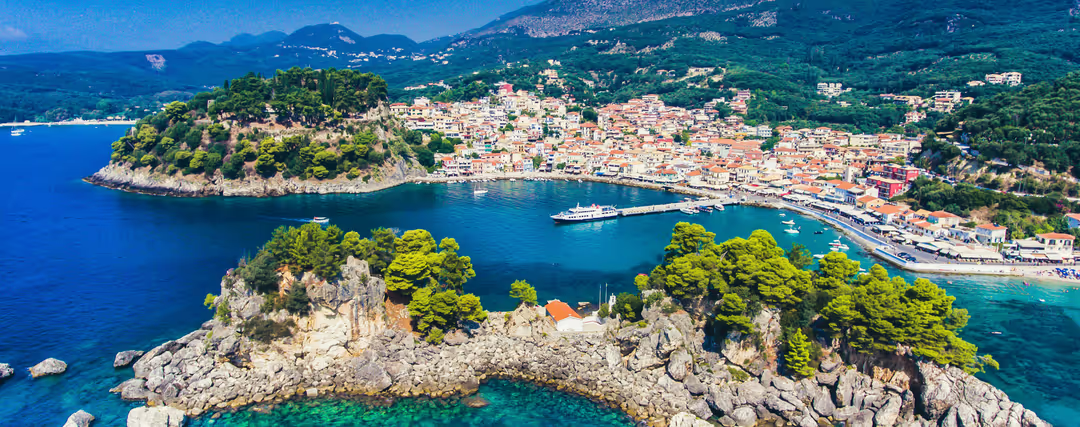

Are you going to do your Erasmus in Greece? You’ve come to the right place! In this article, we tell you useful information for your exchange, such as information of the best cities to study in, options and requirements for students, what to do in your free time, data on the different student accommodation alternatives and the best Universities in the country.
From the ancient ruins that tell the history of past civilizations to the lively squares where contemporary life unfolds, let us show you why this country, with its rich academic tradition and passionate way of life, becomes an ideal destination for an international educational experience.
Greece, with its rich history and vibrant culture, offers several cities that have become prominent destinations for Erasmus students. Thessaloniki, the country's second-largest city, is a top pick with its ancient monuments, such as the White Tower and the Rotunda, and its lively nightlife in the Ladadika district. For its part, Athens, the Greek capital and home to the ancient Acropolis and the Parthenon, breathes history around every corner. Another outstanding destination is Patras, the country's third largest city situated at the foot of Mount Panachaiko and overlooking the Gulf of Patras. Also of note are destinations on the wonderful Greek islands, such as Heraklion and Rethymno in Crete, which provide the opportunity to experience island life.
These are some of the basic requirements and formalities for international students:
Greece is the cradle of Western civilization, and its historical legacy is present in every corner. From the Acropolis in Athens to the ancient theatres in Epidaurus, an exchange in Greece allows you to immerse yourself in a unique cultural richness.
During your Erasmus, you’ll have the opportunity to immerse yourself in the Greek way of life, which is both relaxed and lively. In addition, the locals are very hospitable, which is going to allow you to immerse yourself in the culture fully if you make the effort to get to know the Greeks.
The cost of living for a student is usually much cheaper than in other countries in Europe, so you'll for sure get the most out of your stay. You’ll be able to enjoy the vibrant nightlife in traditional tavernas and trendy clubs all you want!
Another reason to study in Greece is its geographical location. It’s strategically located for exploring other parts of the continent and the Mediterranean, such as Italy, Turkey or the Balkans. We also encourage you to visit as many Greek islands as you can - they are unique! And don't just stick to the typical Mykonos and Santorini, but go to other lesser-known but equally incredible ones, such as Eos, Paros, Naxos, Crete, Milos and Hydra.
There are endless things to do during your exchange in "the land of the Gods"!
If you’re a history lover, Athens, with its majestic Acropolis, immerses you in the grandeur of ancient Greece. Not far away, in Delphi, you can explore the ancient sanctuary of Apollo and the famous Oracle. In addition, the island of Crete is home to the Knossos Palace, a Minoan archaeological site that reveals the mysteries of Europe's oldest civilization. And we could name a thousand more sites!
For urbanites, exploring destinations like Athens, Thessaloniki and Patras to the fullest is a must. We also recommend visiting smaller towns and cities that have their charm, such as Rhodes Town on the island of the same name, Heraklion on the beautiful island of Crete and Oia on Santorini.
If you consider yourself a foodie and aim to sample as many local dishes as you can, you're in luck! We can assure you that the whole country is a gastronomic paradise, featuring delicious fresh dishes. The "gyros" tend to be the most popular among students, but you also have to try the "tzatziki" with pita, the "Spanakopita", the "Souvlaki", and our favourite dish, the "moussaka". If you've been left craving something sweet, you're sure to find a "baklava" or "Loukoumades" to indulge in!
Are you an adventurer and want to enjoy the great outdoors? Besides being able to enjoy sports on the country's beautiful beaches, such as windsurfing on the island of Naxos or Rhodes, there are several plans you can make to enjoy the local nature. For example, in Crete there’s the Samaria Gorge, which offers a challenging hike through spectacular scenery. In addition, the monasteries on the cliffs of Meteora provide a unique and scenic experience. In Greece, you can also go canyoning, climbing, kayaking, cycling, and even skiing!
Find the ideal accommodation in your desired location